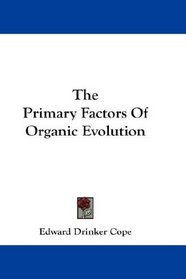Search -
The Primary Factors Of Organic Evolution
The Primary Factors Of Organic Evolution
Author:
Purchase of this book includes free trial access to www.million-books.com where you can read more than a million books for free. This is an OCR edition with typos. Excerpt from book: its parts." On an earlier page of the same chapter, Lamarck thus formulates the laws of organic evolu-. tion, to which his name has been attached. First law. ... more »
Author:
Purchase of this book includes free trial access to www.million-books.com where you can read more than a million books for free. This is an OCR edition with typos. Excerpt from book: its parts." On an earlier page of the same chapter, Lamarck thus formulates the laws of organic evolu-. tion, to which his name has been attached. First law. ... more »
ISBN-13: 9780548254639
ISBN-10: 054825463X
Publication Date: 7/25/2007
Pages: 564
Rating: ?
ISBN-10: 054825463X
Publication Date: 7/25/2007
Pages: 564
Rating: ?
0 stars, based on 0 rating
Publisher: Kessinger Publishing, LLC
Book Type: Hardcover
Other Versions: Paperback
Members Wishing: 0
Reviews: Amazon | Write a Review
Book Type: Hardcover
Other Versions: Paperback
Members Wishing: 0
Reviews: Amazon | Write a Review




